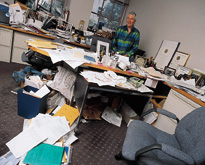EDITOR'S
NOTES
Women
of (stuff and) substance
This
issue feels like what geologists call an inclusion in amber-a
plant, insect, or object trapped in resin millions of years ago.
September 11, with its tragic events, was not that long ago. Yet
September 10 seems millions of years away-as does the relatively
lighthearted mood with which many of this issue's articles were
prepared.
Times
have changed. In From
the President, President Don M. Randel addresses the
University community; in the Chicago
Journal, you'll find a brief account of how the first wave
of events has affected life on campus.

Mistress
of the messy office
Readers
who otherwise enjoyed the June/01 article "Kings of Chaos"
wondered why no female professors were included in its Who's Who
of Messy Offices. The answer is simple. When we did the research,
the Magazine had yet to knock on Janet Rowley's door. Rowley,
PhB'45, SB'46, MD'48, the subject of an "Investigations"
piece (see page 9), has an office that, no doubt about it, should
have made the "Chaos" piece.
The
Blum-Riese distinguished service professor of hematology and oncology
at Chicago, Rowley has occupied her Franklin McLean Memorial Research
Institute office since the mid-1980s, but claims that it wasn't
until two or three years ago that things got really out of hand.
The amount of stuff is striking, as is the lack of ceremony awarded
some very prestigious honors. Her 1999 National Medal of Science,
for instance, is propped against the south wall, along with other
certificates and facing more hung akimbo on the opposite wall.
Her Lasker award, a miniature version of the Winged Victory
of Samothrace marking one of medicine's highest honors, is
normally stored in its box under one of her two desks-a regular-sized
one covered with stacks of papers, and the typing table, on which
she actually works. In the photo, the typing table does double
duty as a dining space; her lunch is plopped atop some papers.
"Cleaning
this place," Rowley explains, "takes time, patience,
and thought-none of which I have right now."
Major
media influences
It
may seem odd to link Miss Frances of the Ding Dong School with
Katharine Graham of the Washington Post, but there are
reasons to do so. Both received degrees from the University-Miss
Frances (more formally known as Dr. Frances R. Horwich) earned
a Ph.B. in 1929, and Katharine Graham earned her A.B. in 1938.
Both died in midsummer-Horwich on July 22, Graham on July 17 (see
"Deaths," page 59). And both had a powerful influence
on many people of my generation-the preschoolers of the 1950s
and the college students of the 1970s.
When
Miss Frances rang her schoolteacher's bell, I felt as if my grandmother
(also a schoolteacher) had entered the living room. I fingerpainted
with the Original Ding Dong School Fingerpaint, read Ding Dong
School books with titles like A Suitcase with a Surprise and
Our Baby, and embarked on a fair share of Miss Frances-inspired
projects. Remembering a vine grown from a sweet potato propped
with toothpicks in a green, vine-patterned ceramic bowl still
produces a sense of accomplishment. With each project, Miss Frances
introduced many of us to a wider world.
Mrs.
Graham provided another introduction to the world and how it works.
The glory moments of her life were well rehearsed in the coverage
of her death, including how, as owner and CEO of the Post
during the era of the Pentagon Papers and the Watergate scandal,
she refused to bow to government pressure. Unlike reporters Woodward
and Bernstein and editor Ben Bradlee, Katharine Graham was never
"immortalized" by a box-office star. But readers of
Personal History, her Pulitzer-winning memoir, met a woman
who became larger than life by virtue of living her life: facing
fears, asking questions, doing her best, doing many things she
never thought she could-and doing them well. She was, in short,
the kind of person Miss Frances hoped all of us preschoolers would
grow up to be. -
M.R.Y.

![]()
